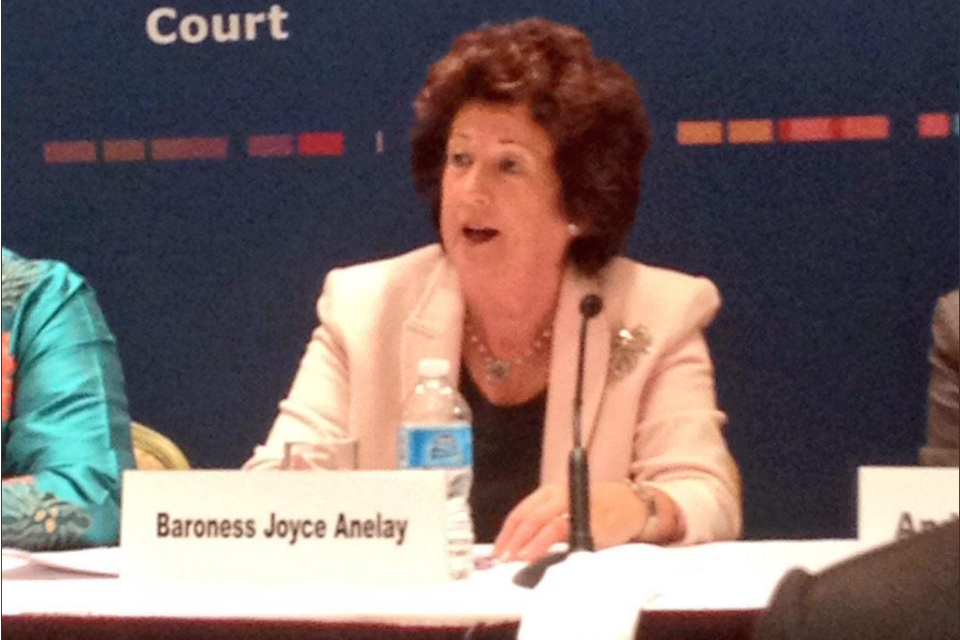'The International Criminal Court must remain at the forefront of global efforts to end impunity'
Statement by Baroness Anelay, UK Minister of State for the Foreign and Commonwealth Office to the Assembly of States Parties to the International Criminal Court

Mr President, Excellencies, Distinguished Delegates,
It is a great pleasure to address this Assembly today on behalf of the United Kingdom. When making this statement I align myself with the statement made earlier on behalf of the European Union and its Member States.
But first, I would like to congratulate His Excellency Sidiqi Kaba on taking up the Presidency of the Assembly. And thank Ambassador Intelmann for all her work.
I also congratulate all those new Judges on their appointment and thank all Judges retiring early next year, including Judge Song as he completes his term as President of the Court.
Mr President,
In my intervention today, I would like to briefly cover three areas:
Sexual violence in conflict;
The UK’s response to allegations against British forces in Iraq;
And improving the efficiency of the Court.
In 2013 my Government launched the UK’s strategy on the International Criminal Court as part of our commitment to ending impunity for the perpetrators of crimes which - as the Rome Statute states - shock the conscience of humanity.
Among those crimes, rape and sexual violence in armed conflict are now rightly considered war crimes and grave breaches of the Geneva Conventions.
The UK is proud to be one of 155 States who, in endorsing the Declaration of Commitment at the UN General Assembly in 2013, helped to reaffirm them as such.
In June, the UK hosted the Global Summit to End Sexual Violence in Conflict - when we launched the International Protocol on the Investigation and Documentation of rape and sexual violence in conflict. This will help significantly to increase successful prosecutions and in doing so help tackle impunity.
The UK also supports the Trust Fund for Victims, which provides assistance and advice on seeking reparations for victims and their families.
And we also welcome the important contribution to tackling sexual and gender based crimes of the Policy Paper by the Office of the Prosecutor.
But to be successful in ending impunity, it is absolutely vital that we all cooperate fully with the International Criminal Court - in keeping with the principles of the Rome Statute, which apply equally to all persons without any distinction based on official capacity. And also, when it is our own state that is affected.
In May, the Prosecutor of the Court announced the reopening of a preliminary examination into allegations of abuses by UK forces in Iraq.
My Government is cooperating fully with the Prosecutor in this matter: we recognise that the proper procedures must be followed when serious complaints are made.
While we reject the allegation that there was systematic abuse by UK forces in Iraq, independent authorities are investigating the allegations comprehensively.
We are therefore confident that we will be able to demonstrate to the Prosecutor that these matters are being thoroughly dealt with at national level in accordance with the UK’s Rome Statute obligations and that this will demonstrate complementarity in action.
But in addition to cooperating with the Court, it is also essential that we ensure it operates as efficiently as possible.
We congratulate the Court for delivering its first ever final judgment of the Appeals Chamber in the case of Thomas Lubanga, and a final judgment in the case of Germain Katanga.
We recognise that the workload of the Court is increasing - and so it may need additional resources for a time, which States Parties have provided every year since the Court began.
But in return, the Court must ensure it works as efficiently and effectively as possible, mindful of the financial constraints States are under. One positive example is the Registrar’s plans to reorganise the Registry - and we look forward to seeing the results next year.
To conclude, Mr President,
As the nature of conflict and security challenges evolve, the International Criminal Court must remain at the forefront of global efforts to end impunity.
That is why all States Parties must fulfil their duty to cooperate with the Court as it strives to fulfil the mandate that we have given it.
And that is why we must all remain committed to ensuring that those without a voice must be heard.
And do all within our power to ensure victims are at the centre of our efforts to deliver justice.